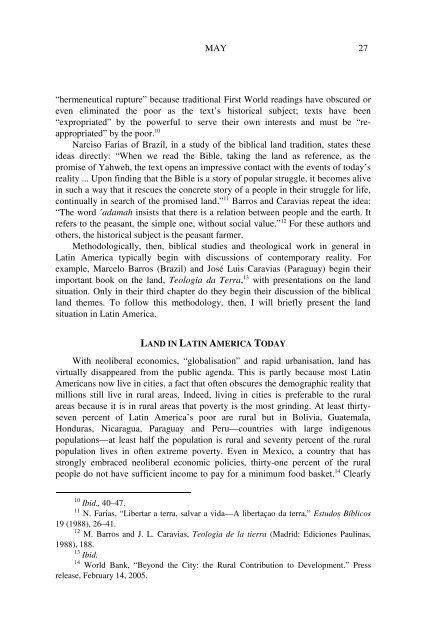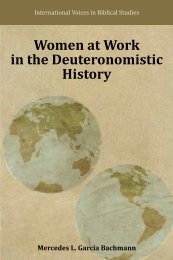Global Hermeneutics? - International Voices in Biblical Studies ...
Global Hermeneutics? - International Voices in Biblical Studies ...
Global Hermeneutics? - International Voices in Biblical Studies ...
Create successful ePaper yourself
Turn your PDF publications into a flip-book with our unique Google optimized e-Paper software.
MAY 27<br />
“hermeneutical rupture” because traditional First World read<strong>in</strong>gs have obscured or<br />
even elim<strong>in</strong>ated the poor as the text’s historical subject; texts have been<br />
“expropriated” by the powerful to serve their own <strong>in</strong>terests and must be “reappropriated”<br />
by the poor. 10<br />
Narciso Farias of Brazil, <strong>in</strong> a study of the biblical land tradition, states these<br />
ideas directly: “When we read the Bible, tak<strong>in</strong>g the land as reference, as the<br />
promise of Yahweh, the text opens an impressive contact with the events of today’s<br />
reality ... Upon f<strong>in</strong>d<strong>in</strong>g that the Bible is a story of popular struggle, it becomes alive<br />
<strong>in</strong> such a way that it rescues the concrete story of a people <strong>in</strong> their struggle for life,<br />
cont<strong>in</strong>ually <strong>in</strong> search of the promised land.” 11 Barros and Caravias repeat the idea:<br />
“The word ´adamah <strong>in</strong>sists that there is a relation between people and the earth. It<br />
refers to the peasant, the simple one, without social value.” 12 For these authors and<br />
others, the historical subject is the peasant farmer.<br />
Methodologically, then, biblical studies and theological work <strong>in</strong> general <strong>in</strong><br />
Lat<strong>in</strong> America typically beg<strong>in</strong> with discussions of contemporary reality. For<br />
example, Marcelo Barros (Brazil) and José Luis Caravias (Paraguay) beg<strong>in</strong> their<br />
important book on the land, Teologia da Terra, 13 with presentations on the land<br />
situation. Only <strong>in</strong> their third chapter do they beg<strong>in</strong> their discussion of the biblical<br />
land themes. To follow this methodology, then, I will briefly present the land<br />
situation <strong>in</strong> Lat<strong>in</strong> America.<br />
LAND IN LATIN AMERICA TODAY<br />
With neoliberal economics, “globalisation” and rapid urbanisation, land has<br />
virtually disappeared from the public agenda. This is partly because most Lat<strong>in</strong><br />
Americans now live <strong>in</strong> cities, a fact that often obscures the demographic reality that<br />
millions still live <strong>in</strong> rural areas. Indeed, liv<strong>in</strong>g <strong>in</strong> cities is preferable to the rural<br />
areas because it is <strong>in</strong> rural areas that poverty is the most gr<strong>in</strong>d<strong>in</strong>g. At least thirtyseven<br />
percent of Lat<strong>in</strong> America’s poor are rural but <strong>in</strong> Bolivia, Guatemala,<br />
Honduras, Nicaragua, Paraguay and Peru—countries with large <strong>in</strong>digenous<br />
populations—at least half the population is rural and seventy percent of the rural<br />
population lives <strong>in</strong> often extreme poverty. Even <strong>in</strong> Mexico, a country that has<br />
strongly embraced neoliberal economic policies, thirty-one percent of the rural<br />
people do not have sufficient <strong>in</strong>come to pay for a m<strong>in</strong>imum food basket. 14 Clearly<br />
10 Ibid., 40–47.<br />
11 N. Farias, “Libertar a terra, salvar a vida—A libertaçao da terra,” Estudos Bíblicos<br />
19 (1988), 26–41.<br />
12 M. Barros and J. L. Caravias, Teologia de la tierra (Madrid: Ediciones Paul<strong>in</strong>as,<br />
1988), 188.<br />
13 Ibid.<br />
14 World Bank, “Beyond the City: the Rural Contribution to Development.” Press<br />
release, February 14, 2005.




